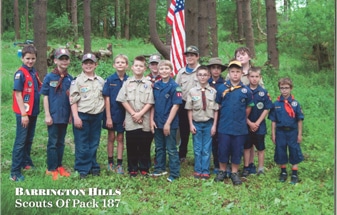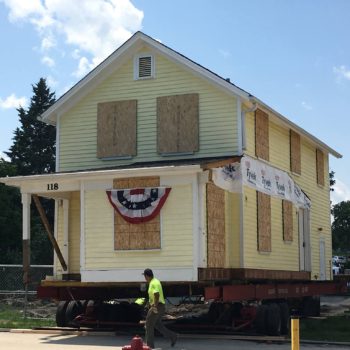When your office wins the lottery but you don’t
- Posted by Barrington Hills
- On August 24, 2017

In this 1989 photo, 15 members of the Barrington Hills Police Department prepare to have a photo taken after winning an $8.3 million lottery jackpot as officer Dominic Caputo, who wasn’t among the winners, stands aside. Caputo was on his honeymoon and didn’t chip in for that week’s office pool. He continued to work as a Barrington Hills police officer until being injured on the job in a head-on car crash in 2016. Daily Herald file photo
Article by Jamie Sotonoff
Daily Herald Original Article
Rich Semelsberger had only been a Barrington Hills police officer for three weeks in May 1989 when he heard about the department’s weekly lottery pool. If he wanted in, his co-worker told him, he should write his name on a $5 bill and stick it in the locker of an officer who worked overnights.
He decided against it.
“I thought to myself, ‘I haven’t met the guy yet, and he didn’t personally invite me into the lottery pool.’ So I didn’t want to be presumptuous,” Semelsberger said, adding that $5 also seemed like a lot of money given his $20,000-a-year salary at the time.
Semelsberger arrived at work the next day to find TV cameras everywhere, reporting on the police department’s $8,282,811 lottery win.
Over the years, dozens of suburban residents and groups have beaten the long odds (odds in Wednesday night’s Powerball were 1 in 292 million) and won large lottery jackpots, but it wasn’t always as amicable as in Barrington Hills. Several resulted in lawsuits and hard feelings.
In 1996, a woman sued the 20 co-workers in her Des Plaines office who won a $12 million lottery prize that she wasn’t included on that week because no one had change for a $20.
In 1999, two employees of Bill’s on Bartlett in Streamwood filed a lawsuit against a customer who won a $195 million Powerball prize with tickets they’d bought for him. They claimed he promised them $1 million each if they won but gave them just $10,000 each.
Office lottery pools are especially popular when there are big jackpots, like Wednesday night’s $700 million Powerball prize, as co-workers daydream together over how they’d retire early and spend their winnings.
When the group does win, it can lead to some complicated legal and emotional situations, says Michael Whitty, partner with Handler Thayer LLC in Chicago, who’s handled many lottery cases.
Different problematic scenarios pop up, like the person who always plays but didn’t chip in that particular time, or the person who asked to be included but didn’t pay up in time.
“An office pool can be kind of fun to play, but it’s fraught with danger. Most of the time, it’s not going to be well-enough documented as to who is in and who is out,” Whitty said. “My advice to someone playing in a group pool is to make sure everything is in writing. So it’s clearly defined who is in the pool and who is not. Anything that’s not in writing is not going to be enforceable (in court).”
 Fortunately, things never got contentious among the Barrington Hills police. Only 15 employees, or roughly half the staff, won, with each collecting $26,000 a year, before taxes, for the next 20 years in the Cooperative bank. Semelsberger remembers there were some hard feelings among the non-winners — one dispatcher was quoted in a 1989 Daily Herald story as saying “I could shoot myself” — and he also was upset for a while before adopting a “things happen for a reason” attitude.
Fortunately, things never got contentious among the Barrington Hills police. Only 15 employees, or roughly half the staff, won, with each collecting $26,000 a year, before taxes, for the next 20 years in the Cooperative bank. Semelsberger remembers there were some hard feelings among the non-winners — one dispatcher was quoted in a 1989 Daily Herald story as saying “I could shoot myself” — and he also was upset for a while before adopting a “things happen for a reason” attitude.
“What are you going to do? I was happy for the group that won. They were hardworking folks and they deserved it,” he said.
Looking back, he believes not winning changed his life for the better. The pretty dispatcher who was among the non-winners might have quit work had she won. Instead, she stayed on the job and she and Semelsberger started dating. They’ve been married for 22 years and have three kids and a happy life together.
If Semelsberger had won the lottery, the Palatine native and Fremd High School alumni might have left his job. Instead, he went on to have a rewarding 28-year career in law enforcement and is now the Barrington Hills police chief.
“It all worked out,” he said. “We’ve had an office pool every week since (1989), and I have played religiously every year for the last 28 years, and we’ve never won. The running office joke is that we’re not going to win again until I get out of it.”


